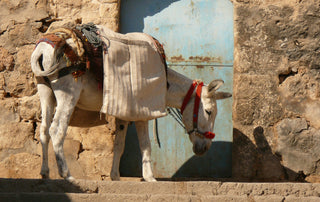Doorways to great buildings are overlooked because visitors are eager to see what’s beyond them. Positioned at the start of Easter week, the account of how Jesus acquired an animal to enter Jerusalem is also overlooked, yet it’s a fascinating event. Let me give you Mark’s account.
As they approached Jerusalem and came to Bethphage and Bethany at the Mount of Olives, Jesus sent two of his disciples, saying to them, ‘Go to the village ahead of you, and just as you enter it, you will find a colt tied there, which no one has ever ridden. Untie it and bring it here. If anyone asks you, “Why are you doing this?” say, “The Lord needs it and will send it back here shortly.”’ They went and found a colt outside in the street, tied at a doorway. As they untied it, some people standing there asked, ‘What are you doing, untying that colt?’ They answered as Jesus had told them to, and the people let them go. When they brought the colt to Jesus and threw their cloaks over it, he sat on it. (Mark 11:1-7 NIV)
A few preliminary observations. A colt is a young donkey, untrained for work: an adolescent animal, all muscle and no meekness.
Jesus instructs two of his disciples to bring him an unridden colt that will be found ‘just as you enter’ the village. He tells them a phrase, ‘The Lord needs it and will send it back here shortly’, and the disciples find the colt ‘in the street, tied at a doorway’. The two untie the colt and are questioned by the ‘people standing there’, but after speaking Jesus’ words, they are allowed to take the colt. The animal is brought to Jesus, cloaks are put on it and he then rides the few miles into Jerusalem. In doing so Jesus is openly claiming to fulfil Zechariah 9:9 and so to be God’s Messiah.
I am struck by Jesus’ demand: ‘The Lord needs it.’ May I draw your attention to five things?
First, a demand from Jesus comes with authority. As ‘the Lord’, Jesus is simply stating his rights as God, the ultimate owner of everything: people, possessions and even animals. We have nothing that is truly our own. All we have – even our lives – is a gift from God to us and can be demanded for his use.
Second, a demand from Jesus can be costly. Animals were valuable, especially a colt with a whole working life ahead of it. But did you notice that the colt (and presumably the mother) was ‘in the street, tied at a doorway’? They were neither penned in a stable, grazing in a pasture nor held safely in a courtyard. This suggests the donkey was in use, so these animals were temporarily tied up – ‘parked’ – on the public highway. Nevertheless, at the words ‘the Lord needs it’, possession is handed over. We may think we have good uses for our resources. But if the Lord says, ‘I need it’, then the only wise thing is to give him what he demands.
Third, a demand from Jesus needs no explanation. Jesus doesn’t say why he wants the colt; he just says, ‘The Lord needs it.’ He has the right to make demands without any justification. That he needs the animal to fulfil prophecy will only become apparent later. This is important. It’s not our business to ask God to explain why he does actions or makes demands. To insist on an explanation is no longer to kneel before God on his throne but to seek to sit with him at a negotiating table. When we feel certain that God wants us to do something then we are well advised to do it. Explanations can wait; obedience can’t.
Fourth, a demand from Jesus can come through his disciples. Jesus does not personally stride out and say, ‘I demand this animal.’ Instead, he sends his followers with his demand. Christ’s authority for commands and demands – ‘in my name’ – can be delegated to his followers. When in evangelism we tell the world to believe in Jesus and become his disciples (Matthew 28:18-20), our words have that delegated authority. Of course, such claims of a transmitted authority must not be abused; all requests made in God’s name must be evaluated. Through this letter I am asking for support; whether you feel the Lord’s demand behind it I leave to you.
Finally, a demand from Jesus comes with a promise. The text reads, ‘The Lord needs it and will send it back here shortly.’ Jesus declares that he is not stealing this valuable animal, merely borrowing it. It will be returned. (Did the owner subsequently market the colt under the phrase ‘As ridden by Jesus’?) This of course says that our giving to God is ultimately an investment in the best and most secure bank ever. There will be a day when all we have given to God will be repaid in full – perhaps in this life but certainly in the next. Indeed, that repayment might come soon, whether at the Lord’s coming back to us or by us going to him.
That this account mentions a doorway is an insightful touch. It is a doorway to the Easter story, but it is perhaps also a doorway to the obedience and blessing of giving. It was said then, ‘The Lord needs it.’ Are those words said to you today?
Would you please prayerfully consider becoming a monthly partner or making a donation today? Are you able to sow some of the seed which the Lord has entrusted to you, to be sown into our ministry to continue to see Christ’s Kingdom extended?
Keep the faith.
J.John
Reverend Canon




